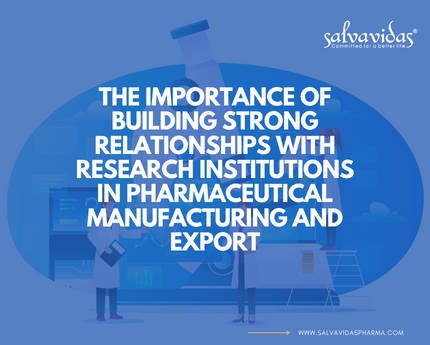
Introduction:
In the pharmaceutical industry, research and development (R&D) play a critical role in driving innovation and progress. To ensure that pharmaceutical products are of high quality, effective, and safe, research institutions work tirelessly to discover new drugs, test their efficacy, and ensure compliance with regulatory standards. However, for pharmaceutical companies to bring these drugs to the market, they must partner with these research institutions and build strong relationships. In this article, we explore the importance of building strong relationships with research institutions in pharmaceutical manufacturing and export.
Why is it important to build strong relationships with research institutions in pharmaceutical manufacturing and export?
Access to Expertise: Research institutions have a wealth of expertise in different areas of pharmaceutical R&D, including drug discovery, preclinical research, clinical trials, and regulatory compliance. By building strong relationships with these institutions, pharmaceutical companies can access this expertise and leverage it to enhance their own capabilities.
Improved Product Development: Collaborating with research institutions can lead to faster and more efficient drug development processes. By leveraging the research institutions’ expertise and resources, pharmaceutical companies can improve their product development processes and bring their products to the market faster.
Regulatory Compliance: Compliance with regulatory standards is critical in the pharmaceutical industry. Research institutions have the expertise and knowledge to ensure compliance with regulations, making it easier for pharmaceutical companies to navigate the regulatory landscape and bring their products to the market.
Brand Reputation: Partnering with reputable research institutions can enhance a pharmaceutical company’s brand reputation. By collaborating with respected research institutions, pharmaceutical companies can demonstrate their commitment to producing high-quality, safe, and effective drugs.
How to Build Strong Relationships with Research Institutions in Pharmaceutical Manufacturing and Export?
Establish clear communication channels: Effective communication is key to building strong relationships. It is important to establish clear communication channels with research institutions and maintain regular communication
Collaborate on R&D projects: Collaborating on R&D projects with research institutions can help pharmaceutical companies to access expertise, resources, and knowledge, leading to improved product development processes.
Attend industry events: Attending industry events such as conferences, trade shows, and seminars can help pharmaceutical companies to network with research institutions and establish new partnerships.
Leverage technology: Leveraging technology such as collaborative workspaces and digital platforms can help to streamline communication and collaboration between pharmaceutical companies and research institutions.
FAQs:
Q: Can building strong relationships with research institutions lead to cost savings for pharmaceutical companies?
A: Yes, building strong relationships with research institutions can lead to cost savings for pharmaceutical companies. By leveraging the research institutions’ expertise and resources, pharmaceutical companies can improve their product development processes, reducing the time and costs associated with bringing drugs to the market.
Q: Is it important for pharmaceutical companies to partner with research institutions in other countries?
A: Yes, partnering with research institutions in other countries can provide access to different expertise and resources, leading to improved product development processes and the ability to enter new markets.
Conclusion:
In conclusion, building strong relationships with research institutions is critical for the success of pharmaceutical manufacturing and export. By accessing expertise, resources, and knowledge, pharmaceutical companies can improve their product development processes, comply with regulatory standards, and enhance their brand reputation. To achieve these benefits, it is important to establish clear communication channels, collaborate on R&D projects, attend industry events, and leverage technology. By building strong relationships with research institutions, pharmaceutical companies can drive innovation and progress in the industry.




0